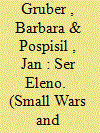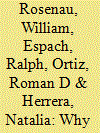|
|
|
Sort Order |
|
|
|
Items / Page
|
|
|
|
|
|
|
| Srl | Item |
| 1 |
ID:
158962


|
|
|
|
|
| Summary/Abstract |
In June 2016, the Colombian Government and the FARC insurgent movement signed a ceasefire agreement, which brings the two sides one step closer to putting an end to over five decades of war. Unfortunately, Latin America has a rich history of insurgent movements, particularly during the cold war era, some of which continue to operate today. Most of these movements disappeared due to military operations, though some did so via peace negotiations. This essay aims to discuss the various ends of Latin American insurgencies to answer whether, indeed, insurgents can be negotiated with.
|
|
|
|
|
|
|
|
|
|
|
|
|
|
|
|
| 2 |
ID:
093927


|
|
|
| 3 |
ID:
139105


|
|
|
|
|
| Summary/Abstract |
In conflict studies, identity has been posited as an explanatory factor of the resilience of insurgencies. This article focuses on the identity formation of the National Liberation Army (ELN), a leftist insurgency group in Colombia. As a Marxist–Leninist organisation, the ELN aims to overcome capitalism. In their perception, this is possible via the transformation of the individual into a ‘collective personality’. Along the dimensions of ‘content’ and ‘contestation’, we will demonstrate the mechanisms they impose for such identity formation. Identity, as we will argue, is a main factor in explaining why people participate in this insurgency and thereby enhance its resilience.
|
|
|
|
|
|
|
|
|
|
|
|
|
|
|
|
| 4 |
ID:
132293


|
|
|
|
|
| Publication |
2014.
|
| Summary/Abstract |
For nearly ten years the Colombian government has systematically debriefed men and women who have left the Revolutionary Armed Forces of Colombia (FARC) and other violent extremist organizations. Today, the Colombian government maintains a database of more than 15,000 digitized interview transcripts-the largest of its kind in the world. With the proper enhancements and analysis, the database can provide critical insights into topics such as extremist recruitment, motivation, information operations, intelligence activities, leadership, and tactical and operational adaptation and innovation. Although Colombia's political violence is unique in many respects, further research using the database contributes to our understanding of the dynamics of insurgency in other regions. Ultimately, this research could enhance efforts to prevent recruitment into, and encourage current members to exit from violent non-state groups, such as gangs, terrorist groups, militias, and drug trafficking organizations.
|
|
|
|
|
|
|
|
|
|
|
|
|
|
|
|
|
|
|
|
|